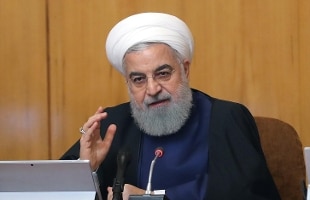- Saudi Arabia. Iran against the US: 'Blaming us will not stop the disaster in Yemen'
- Pompey accuses Iran of attacks on Saudi refineries. Halved production. Use: we will use reserves
- Iran: "Activate advanced centrifuges for uranium enrichment". Usa: "We are not surprised"
Share
September 16, 2019While Iran announces to increase uranium production, the United States is abandoning unilateral agreements and the controversy over the drones flying over the skies of the Middle East, presidents Hassan Rohani and Donald Trump, respectively of Iran and the US , they don't want to meet yet. Meanwhile, oil prices are rising given the continuing tensions between Washington and Tehran in the Persian Gulf and the attack claimed by Yemenite rebels against two Saudi plants.Iran has ruled out the possibility of a meeting between Hassan Rohani and Donald Trump, on the sidelines of the UN General Assembly, scheduled in New York from 17 to 27 September. "Such an event is not on our agenda nor will it happen. The meeting will not take place until the necessary conditions are met," said Iranian Foreign Ministry spokesman Abbas Mousavi.
Negotiation for a new nuclear deal
Trump had made himself available a few days ago to meet Iranian President Rohani "without any problem". Instead, the Iran of this meeting does not want to know: "As we have already said, if the Americans return to the JCPOA (agreement on the Iranian nuclear signed in 2015 but then abandoned and subsequently recalled with sanctions from the United States) and put an end to their terrorism economic, can join the joint commission and discuss, "added Moussavi.
Iran in all this announced last July that it will increase the uranium enrichment rate by up to 5%, despite up to 2030 based on the agreement with the West - repressed by Washingotn - it cannot exceed the threshold of 3 , 67%. The fear is that Iran will arrive at the production of nuclear weapons, a threat also for neighboring Israel, a faithful ally of the United States. The road leading to the resumption of negotiations between the United States and Iran, regarding the nuclear agreement, and a meeting between the presidents of the two states, therefore appears to be all uphill.
A sensitive issue also for the economy
French President Emmanuel Macron, from the G7 in Biarritz last August, had been pushing for an imminent meeting between the Trump-Rohani presidents. "But first the United States should act by lifting all illegal, unfair and unjust sanctions imposed on Iran," Rohani had said.
Meanwhile, an anti-Iran hawk, the aggressive American national security advisor John Bolton, was thrown out. "We cannot rely on President Trump's statements because they last less than 24 hours," explained Moussavi.
The two countries, as well as Israel, Saudi Arabia, but also Russia and Turkey (with whom Rohani is meeting for a trilateral on Syria), are studied and spied on with drones in the skies of the Persian Gulf. The US Secretary of State, Mike Pompeo, has accused Tehran of Saturday's attacks on Aramco's Saudi oil facilities, but Iran has denied saying: "Instead of blaming other countries, the US takes note that the problems of this region derive from their presence in the area ".
China has not remained silent and the Foreign Ministry considers "irresponsible" to blame anyone for attacks on Saudi oil facilities without a full investigation into the incident. "We hope - added Beijing - that the two can exercise restraint and defend peace and stability in the Middle East".

